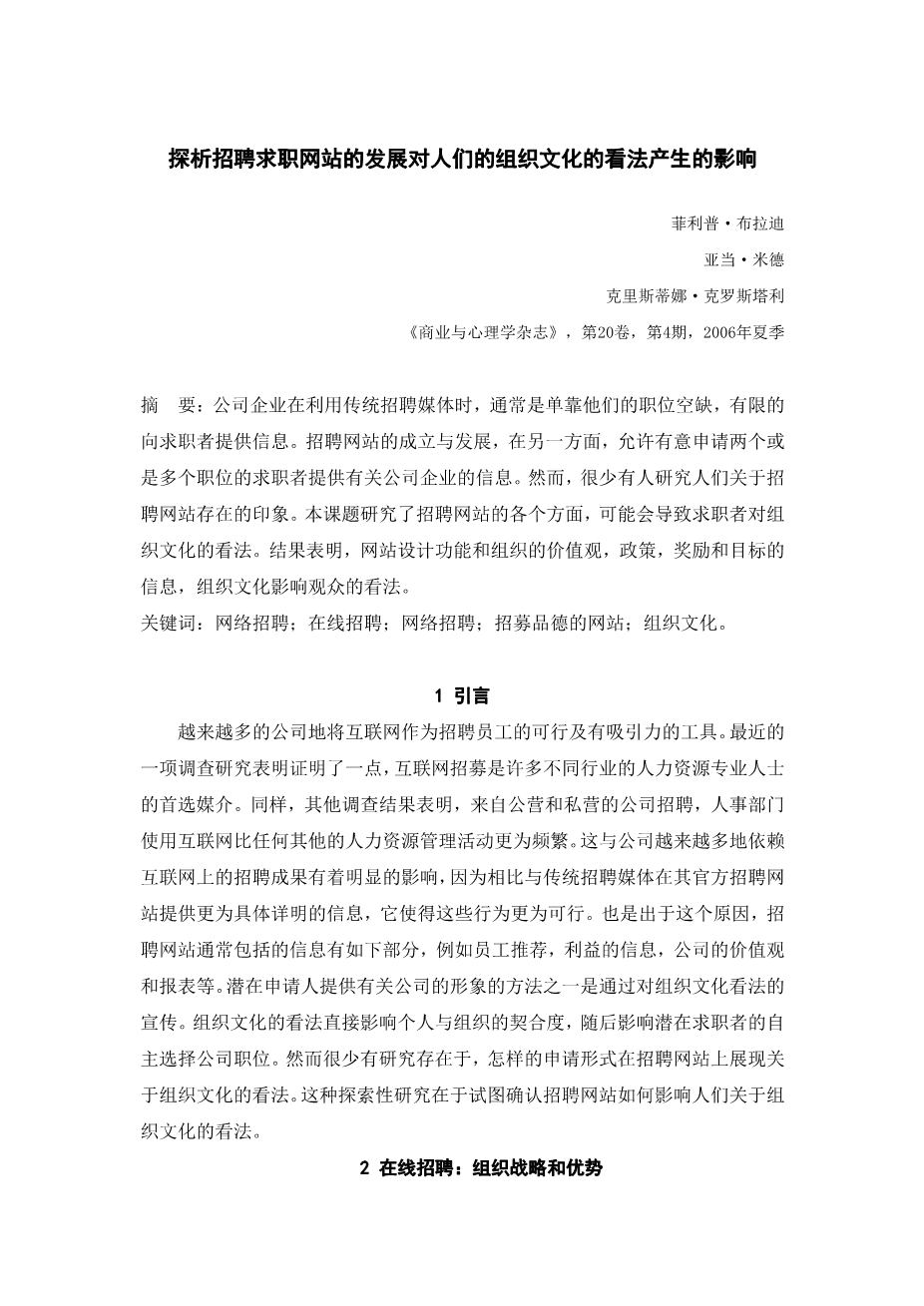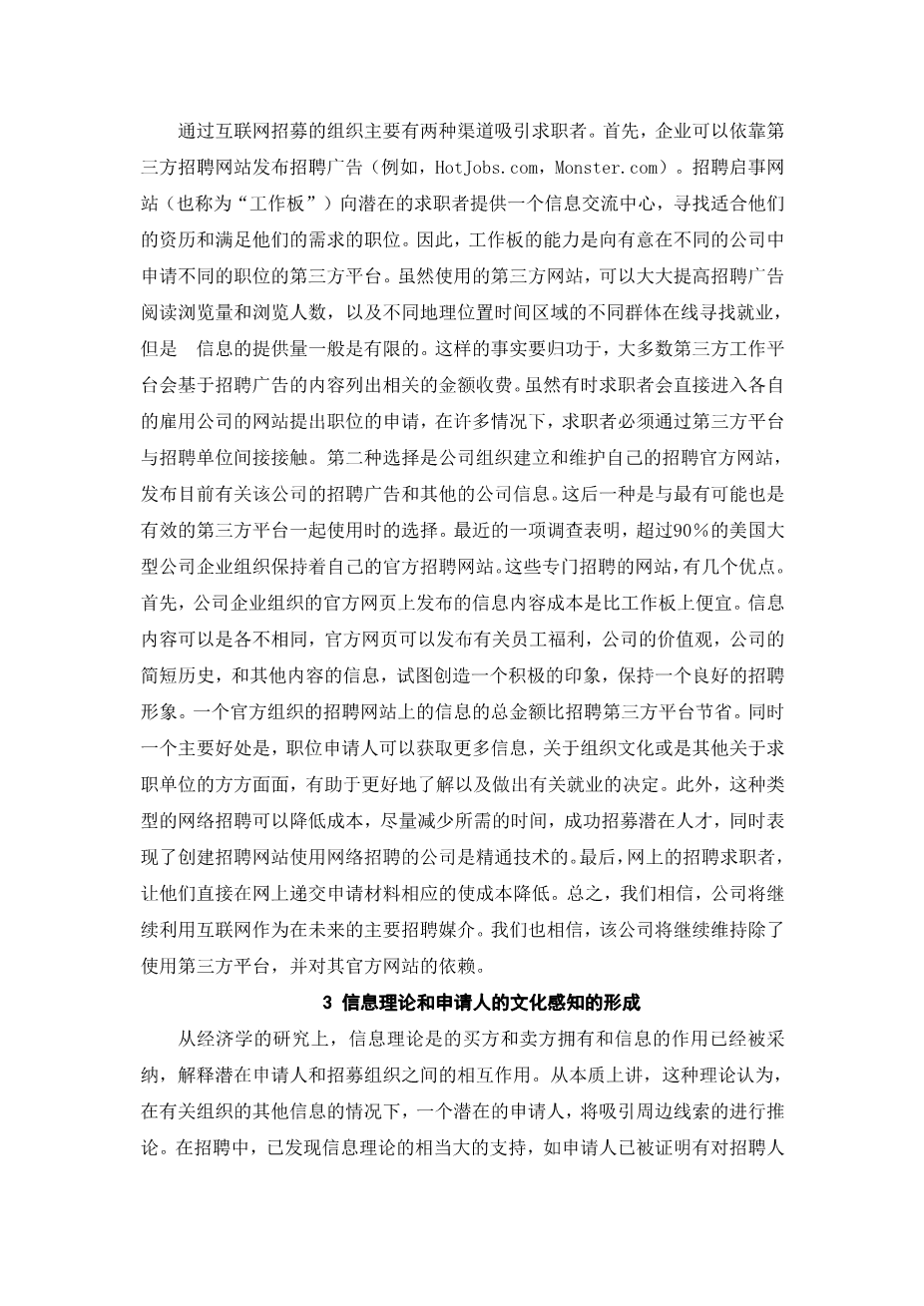ORGANIZATIONAL RECRUITMENT
WEBSITE EFFECTS ON VIEWERS'
PERCEPTIONS OF ORGANIZATIONAL
CULTURE
Phillip W. Braddy
Adam W. Meade
Christina M. Kroustalis
North Carolina State University
Journal of Business and Psychology,Vol.20,No.4,Summer 2006.
ABSTRACT: When utilizing traditional recruitment media, organizations are typically limited to providing job seekers with information solely on their vacant positions. Organizational recruitment websites, on the other hand, allow organizations to provide prospective applicants with both job descriptions and other information about the organization. However, little research exists regarding the impressions that viewers gain from organizational recruitment websites. The present study identified aspects of recruitment websites that may give rise to job seekers' perceptions of organizational culture. Results indicated that both website design features and information about organizational values, policies, awards, and goals affected viewers' perceptions of organizational culture.
KEY WORDS: Internet recruiting; online recruiting; web recruiting; recruit ment websites; organizational culture.
INTRODUCTION
Many organizations increasingly view the Internet as a viable and attractive tool for recruiting employees (Cober, Brown, Blumental, Doverspike, amp; Levy, 2000; Harrington, 2002). This is evidenced by recent survey research that indicates the Internet was the preferred medium of HR professionals when recruiting applicants for many positions in diverse industries (Chapman amp; Webster, 2003). Likewise, results of other surveys suggest that companies from both private and public sectors use the Internet more frequently for recruiting applicants than for any other HRM activity (e.g., Elliot amp; Tevavichulada, 1999). This increased reliance on the Internet has salient implications for organizations because it enables them to provide much more information on their official recruitment websites than is feasible with traditional recruitment media. Organizations provide this information in hopes that potential applicants favorably view the organization as a potential employer. For this reason, organizational recruitment websites commonly include features such as employee testimonials, benefits information, and organizational values statements. One way in which potential applicants draw conclusions about the organization is via perceptions of the culture of the organization. Perceptions of organizational culture directly affect perceptions of person-organization fit, which can subsequently affect how potential applicants self-select organizations (Judge amp; Cable, 1997). How ever, very little research exists regarding how applicants form culture perceptions from recruitment websites. Thus, this exploratory study at tempts to identify aspects of websites that influence viewer perceptions of organizational culture impressions.
Online Recruiting: Organizational Strategies and Benefits
Organizations recruiting via the Internet have two primary avenues to attract viewers into the applicant pool. First, organizations can rely upon third-parties that distribute job advertisements on a job listing website (e.g., HotJobs.com, Monster.com). Job listing websites (a.k.a., "job boards") have the advantage of providing a clearinghouse for potential job applicants to search across organizations for positions appropriate to their qualifications and that meet their needs. Therefore, job boards have the ability to alert potential applicants to openings in many organizations. While the use of third-party websites or job boards can greatly increase the number of viewers reading the job advertisement and potentially reach a more geographically diverse group of applicants searching for jobs online (Crispin amp; Mehler, 1997), the amount of information that is available to the applicant is generally quite limited. This can likely be attributed to the fact that most third-party job boards charge fees based on the amount of content listed in the job advertisement. Moreover, although applicants are sometimes provided with direct access to the respective hiring companies' websites (Zusman amp; Landis, 2002), in many cases applicants must apply to the hiring organization indirectly through the third-party organization (Recruiting, 1999). A second option is for an organization to create and maintain its own official website to present job advertisements and additional information about the company (Zusman amp; Landis, 2002). This latter option is most likely to be effective when used in conjunction with job boards. One recent survey indicates that over 90% of large U.S. organizations maintain their own official recruiting websites (Cappelli, 2001). These websites, dedicated solely to recruitment, have several advantages. First, content can be posted much more cheaply on the organization's official web page than on a job board. Though content varies consider ably, organizations can post information about employee benefits, organizational values, a brief history of the organization, and additional content to attempt to create a positive impression needed to maintain a favorable recruitment image (Gatewood, Gowan, amp; Lautenschlager, 1993). The overall amount of information on an official organizational recruitment website is much greater than from a job advertisement alone (Braddy, Thompson, Wuensch, amp; Grossnickle, 2003). A major benefit of this additional content is that applicants can acquire more information regarding organizational culture, which may facilitate making better informed employment-related decisions. Additionally, this type of web recruiting can reduce costs (Cober et al., 2000; Kay, 2000; Marcus, 2001), minimize the amount of time required to successfully recruit applicants (Web Recruiting Advantages, 2001), and create the perception that companies who use
剩余内容已隐藏,支付完成后下载完整资料


英语译文共 4 页,剩余内容已隐藏,支付完成后下载完整资料
资料编号:[468102],资料为PDF文档或Word文档,PDF文档可免费转换为Word


